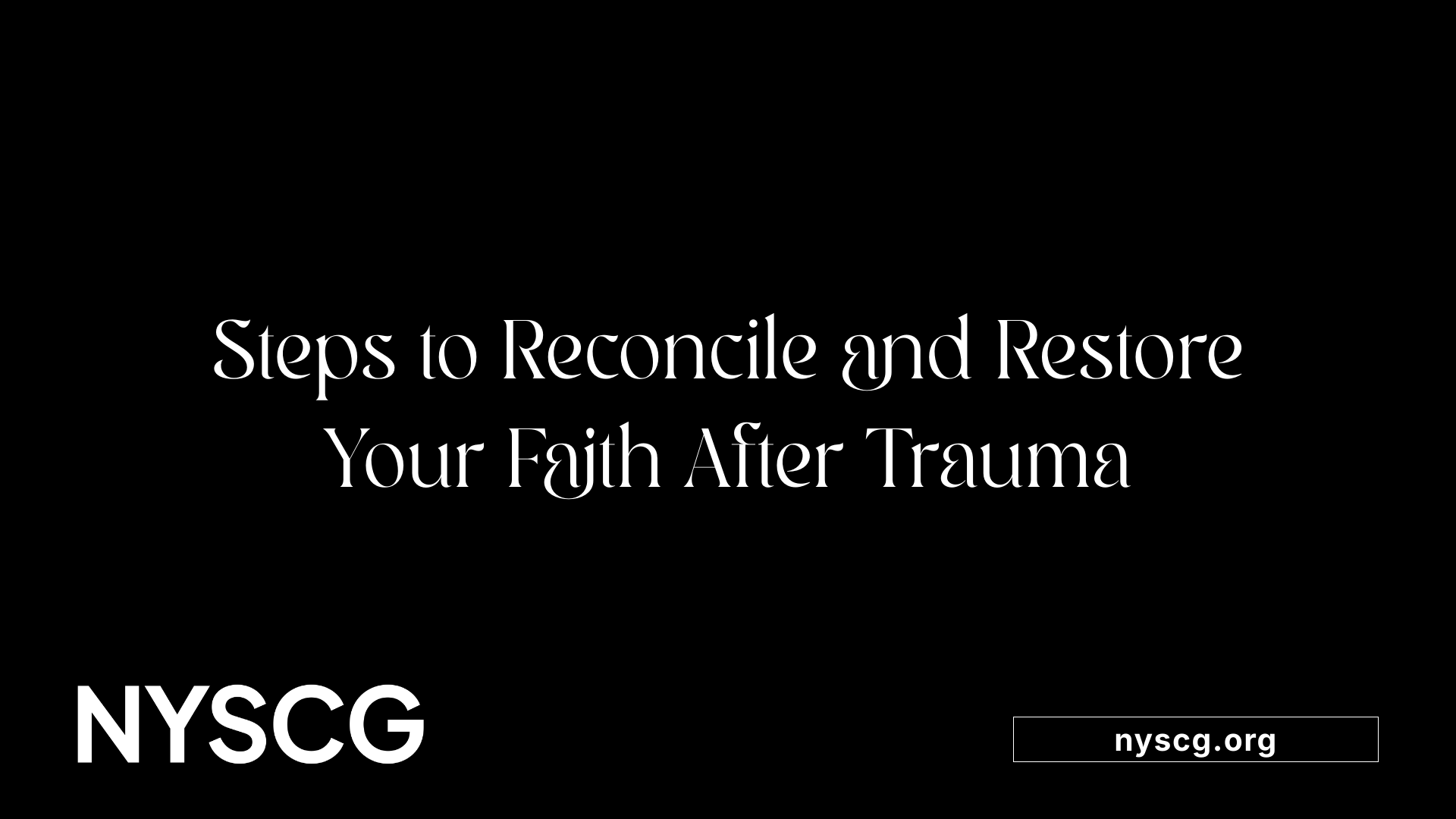Reclaiming Faith After a Traumatic Life Event


Traumatic experiences profoundly impact individuals' spiritual and religious beliefs, often challenging their faith or sparking spiritual struggles. Yet, within these difficulties lie pathways toward healing, renewal, and even post-traumatic growth. This article explores how faith and spirituality interplay with trauma recovery, offering strategies, insights, and inspiring stories to support those seeking to reclaim their faith after trauma.

Trauma can significantly reshape an individual’s spiritual landscape. When people experience overwhelming events, their relationship with their faith or Higher Power can be deeply affected. This can manifest as a loss of trust, feelings of abandonment, or perceiving divine punishment. Such experiences often lead to spiritual struggles that challenge previous beliefs.
In many cases, trauma triggers doubts about divine love or morality, prompting individuals to question their faith foundations. For example, someone may feel betrayed by God or wonder why suffering is permitted to happen, which can cause spiritual disconnection and distress.
Trauma-related spiritual struggles are common. Feelings of guilt and moral injury emerge when individuals believe they are somehow responsible for their suffering or when they struggle with forgiveness—either forgiving others or themselves. This can be compounded by sensations of abandonment, as individuals might feel forsaken by their Higher Power or community.
Doubts about faith are also prevalent. People may wrestle with questions like “Is God real?” or “Why did He allow this to happen?” Such uncertainties can deepen emotional pain, especially if they remain unaddressed.
Trauma can lead to complex emotions toward a Higher Power. Feelings of anger, frustration, or blame can overshadow previous trust and reverence.
Some survivors interpret their suffering as divine punishment, which increases feelings of shame and alienation from their faith community. Others may feel abandoned, believing that God has turned away from them during their darkest moments.
To navigate these struggles, it’s important for individuals to explore their feelings openly and seek spiritual guidance that validates their experiences. Healing involves acknowledging these feelings and working through them, often with professional support and spiritual mentorship.
| Aspect of Spiritual Struggle | Common Experience | Potential Impact on Recovery | Support Strategies |
|---|---|---|---|
| Guilt and Moral Injury | Feeling responsible for trauma | Increased shame, Self-blame | Counseling, spiritual reconciliation |
| Abandonment Feelings | Perception of divine neglect | Spiritual disconnection | Prayer, spiritual counseling |
| Doubt and Questioning | Questions about faith and divine purpose | Crisis of faith | Open dialogue, pastoral care |
Understanding these dynamics is crucial for providing compassionate support to trauma survivors. When spiritual struggles are acknowledged and addressed, they can become part of a healing journey that leads to renewed faith and resilience.
Trauma can significantly shake a person's spiritual or religious beliefs. Many experience feelings of guilt, spiritual alienation, and moral injury. For instance, individuals might feel abandoned by God or punished for their suffering. Such feelings often include doubts about faith or the divine love they once trusted. These spiritual struggles are not rare; they surface as people try to reconcile their traumatic experiences with their beliefs.
Common signs of spiritual distress include a sense of divine punishment, feelings of anger towards God, and doubts about moral values. If these concerns are left unaddressed, they can deepen emotional pain, lead to depression, anxiety, or even spiritual Ahab.
Acknowledging and exploring spiritual conflicts is crucial for recovery. When individuals confront these struggles directly, they often find clarity and peace, which fosters emotional and spiritual renewal. Engaging in honest prayers, seeking spiritual counsel, or consulting chaplains and supportive faith leaders can help clarify misunderstandings and rebuild trust in their faith.
Incorporating spiritual practices that resonate personally is vital. These may include prayer, meditation, or Scripture reading. Such exercises can help promote resilience, providing comfort, purpose, and a sense of divine presence during a challenging healing journey.
Recognizing spiritual struggles as part of the trauma healing process allows individuals to process their experiences more fully. It helps prevent feelings of alienation and supports integration of faith with their healing journey. Healthcare providers, chaplains, and therapists trained in spiritual assessment can facilitate this process by creating a safe space to explore these conflicts.
In summary, understanding and addressing spiritual struggles helps trauma survivors regain a sense of hope, reconnect with their faith, and nurture a resilient spirit, transforming distress into pathways for healing.
Faith can be a vital resource for those healing from traumatic experiences. It provides comfort during difficult times, offering reassurance of divine love and presence. Faith also grants a sense of meaning and purpose, helping individuals process their suffering in a context that emphasizes hope and divine plan.
Engaging with scripture, prayer, and community can foster resilience by helping survivors rebuild trust in a higher power and in others. Many find that spiritual practices offer a pathway to emotional stability and clarity, easing feelings of abandonment and guilt often linked with trauma.
Hope keeps survivors focused on the possibility of recovery and transformation. Faith communities serve as support networks, providing social connection, acceptance, and shared values that bolster mental health.
Prayer acts as a direct communication line to God, helping individuals express their pain, seek guidance, and find solace. Collective worship and support from clergy or chaplains can deepen one's sense of belonging and spiritual strength.
Practicing meditation, mindfulness, and contemplative prayer can lower stress levels and promote emotional regulation. These spiritual disciplines help individuals stay grounded, especially when triggers or flashbacks occur.
Furthermore, acts of worship and service can foster feelings of purpose and agency. Incorporating scripture reading and spiritual reflection into routines reinforces hope and resilience during recovery.
In summary, faith can serve as a foundation for healing by nurturing hope, fostering supportive community bonds, and encouraging spiritual practices that enhance emotional stability. As part of a trauma-informed approach, integrating spiritual care with therapy can lead to a more comprehensive path toward recovery.

Rebuilding faith after trauma involves several intentional steps. First, seeking support from mental health professionals who are sensitive to spiritual struggles can provide crucial guidance. Engaging in trauma-informed therapy helps individuals process their experiences and unlearn harmful beliefs tied to past trauma. reconnecting with personal spiritual practices, such as prayer or meditation, in a safe and comfortable environment can also foster healing.
Establishing healthy boundaries with religious communities is essential. This means choosing environments that promote love, acceptance, and spiritual growth rather than fear or manipulation. Surrounding oneself with supportive, understanding individuals, including trusted friends and spiritual mentors, encourages a safe space for exploration and renewal.
Therapies like cognitive processing therapy and somatic therapy are particularly effective in healing trauma. They help individuals process painful memories, release guilt, and challenge negative core beliefs rooted in past religious abuse or betrayal.
By unlearning harmful residues of religious trauma, therapy supports the development of a healthier, more authentic spirituality. It also encourages the integration of faith and mental health, allowing individuals to pray, worship, and practice their beliefs more honestly without fear or shame.
Developing new spiritual routines that emphasize compassion, forgiveness, and personal growth can foster resilience. Creating boundaries safeguards emotional and spiritual well-being, especially if previous religious communities have been toxic.
Seeking out communities that respect individual journeys and promote healthy spiritual expression allows for rebuilding a resilient, hopeful faith.
| Step | Focus Area | Practical Tips | Additional Notes |
|---|---|---|---|
| Seek Support | Professional Help | Find culturally sensitive therapists | Look for trauma-informed care; |
| Reconnect | Personal Practices | Dedicated prayer, meditation, scripture reading | Focus on healing and acceptance; |
| Set Boundaries | Community Engagement | Limit exposure to harmful environments | Seek supportive and loving spiritual communities |
Trauma recovery is a deeply personal process, but with patience and the right support, rebuilding trust in faith is achievable. Progress might be gradual, but each step forward brings healing and renewed hope.
Faith can play a dual role in healing from trauma. For many, spiritual beliefs provide comfort, purpose, and a sense of community, which are crucial for recovery. Engaging in prayer, scripture reading, and participation in faith communities can foster resilience and hope.
However, faith can also complicate recovery, especially if traumatic experiences involve spiritual abuse, religious guilt, or feelings of abandonment by a Higher Power. Individuals may struggle with feelings of anger, doubt, or betrayal, which can hinder emotional healing.
For example, someone who experiences religious OCD or manipulative spiritual environments may find that their faith becomes a source of anxiety rather than solace. Recognizing these struggles is essential for providing compassionate and effective support.
Addressing trauma effectively requires a comprehensive approach that includes both psychological and spiritual dimensions. Such holistic strategies acknowledge the importance of spiritual beliefs in the healing process.
Incorporating faith into treatment can involve spiritual assessment, engaging clergy or chaplains, and integrating prayer and scripture into therapy. This approach supports the individual’s total well-being, promoting emotional relief alongside spiritual reconciliation.
Trauma-informed care that respects and includes the patient’s spiritual background helps rebuild trust and provides a safe space for healing. Instead of dismissing faith, practitioners can help clients find healthy spiritual paths that foster peace and resilience.
| Aspect | Explanation | Additional Notes |
|---|---|---|
| Spiritual resources | Prayer, scripture, community support | Promote hope, purpose, belonging |
| Spiritual struggles | Guilt, abandonment, anger, doubts | May need targeted counseling |
| Therapy integration | Combining spiritual care and psychological therapy | Enhances overall healing process |
| Support from faith communities | Social connectedness and shared faith practices | Strengthens resilience and PTG |
Understanding and respecting the complex relationship between faith and trauma help facilitate healing, ensuring survivors can reconcile their spiritual beliefs with their recovery journey.

Reconciliation of faith after trauma involves a thoughtful process of reflection, healing, and renewal. Engaging in reflective practices such as prayer, meditation, or journaling can help individuals explore their feelings and doubts. It’s important to seek support from trauma-informed spiritual leaders who understand the complexities of faith struggles.
Setting healthy boundaries with faith communities and spiritual practices can protect emotional wellbeing. This might mean taking a break from harmful environments or distancing oneself from manipulative beliefs.
Renewing spiritual practices in a way that aligns with personal healing is crucial. This could include focusing on compassionate aspects of faith, such as love and forgiveness, rather than fear or guilt. As part of this process, individuals often find it helpful to incorporate scripture or spiritual teachings that promote hope and renewal.
Trusted spiritual leaders serve as vital guides during recovery by providing reassurance, validation, and a safe space for healing. They can help individuals process confusing or painful spiritual emotions, helping to rebuild trust in faith.
By offering a compassionate presence and spiritual counsel tailored to trauma recovery, leaders can facilitate a sense of reconciliation with faith. They support patients in integrating their spiritual beliefs with their healing journey, which is essential for holistic recovery.
Reconciliation often involves practices like prayer, reading scripture, and open dialogue about doubts and fears. Flexibility in spiritual routines allows individuals to find meaningful expressions of faith that support their healing.
Some may choose to join support groups or communities that encourage honest conversations about trauma and faith. Others may pursue personal spiritual growth through creative outlets and quiet reflection.
Engaging with spirituality in a way that emphasizes grace, love, and forgiveness can transform trauma into a pathway for spiritual deepening.
| Aspect | Approach | Benefits | Additional Notes |
|---|---|---|---|
| Reflection | Journaling, meditation | Clarifies feelings, promotes self-awareness | Helps recognize spiritual doubts |
| Support | Spiritual leaders, support groups | Validation, reassurance | Builds trust and community |
| Practice | Flexible prayer, scripture | Personalized healing | Aligns with individual pace |
| Boundaries | Distance from harmful environments | Emotional safety | Essential for healing |
| Growth | Creative activities, worship | Renewed faith, hope | Emphasizes positive spiritual experiences |
Spiritual reconciliation after trauma is a highly personal journey. With patience, guidance, and honest reflection, individuals can restore and deepen their faith, transforming their pain into a source of strength and resilience.
Trauma-focused therapies such as cognitive processing therapy (CPT), dialectical behavior therapy (DBT), and eye movement desensitization and reprocessing (EMDR) play a vital role in trauma recovery. When combined with spiritual practices like scripture reflection and prayer, these therapies support a holistic healing process. These approaches help individuals process traumatic memories and emotional responses while integrating their faith, fostering resilience and hope.
Mental health providers are encouraged to assess their clients' spiritual beliefs, struggles, and coping mechanisms systematically. This assessment helps in understanding how faith influences their trauma response. Collaborations with faith leaders or chaplains can enrich treatment, ensuring culturally sensitive care that respects individual spiritual backgrounds. Incorporating appropriate spiritual practices—like prayer, meditation, or scripture reading—can facilitate deeper healing and support a person's spiritual resilience.
Aligning psychological and spiritual care provides an integrated approach that addresses the whole person, fostering recovery and spiritual growth.
Many individuals have shared their journeys of healing from religious trauma, demonstrating resilience and the possibility of spiritual renewal. One such story is that of Natalie Rose, who endured years of religious abuse within controlling church environments. She developed religious OCD, feeling compelled to recite Bible verses and seek repentance constantly, shadowed by guilt and a distorted sense of purpose.
Through self-awareness and support, Natalie realized the manipulative nature of her spiritual community. She moved toward a healthier understanding of faith, emphasizing love and acceptance over fear and judgment. Her story highlights that recovery involves recognizing harmful patterns, seeking safe environments, and rebuilding trust in genuine spiritual principles.
Resilience can be seen in survivors who actively engage in therapy, reconnect with supportive faith communities, or find solace in alternate spiritual practices. For example, some turn to scripture and prayer as tools for comfort and self-discovery, integrating their faith into their healing process.
Spiritual renewal often includes forgiving oneself, releasing shame, and cultivating hope. The human spirit’s capacity for resilience means that even after profound hurt, rebuilding a sense of purpose and connection is achievable. Stories from survivors affirm that transformation is real and attainable with patience and perseverance.
Community support and professional counseling play vital roles in recovery. Faith communities, when healthy, can provide belonging and encouragement. Chaplains and spiritually informed therapists offer tailored guidance that addresses both emotional and spiritual wounds.
Effective healing often involves integrating spiritual practices like prayer, meditation, and scripture reading with trauma-informed therapy methods such as EMDR or somatic therapy. These approaches help individuals process trauma deeply while nurturing spiritual growth.
| Aspect of Healing | Examples | Additional Benefits |
|---|---|---|
| Personal growth | Reclaiming faith without fear | Developing resilience, hope, and purpose |
| Community support | Faith groups, support circles | Sense of belonging, shared understanding |
| Therapy techniques | EMDR, somatic therapy | Emotional regulation, trauma processing |
| Spiritual practices | Prayer, meditation, scripture | Comfort, peace, divine connection |
They demonstrate that recovery is possible despite profound spiritual wounds. Hearing others’ successes can inspire hope and motivate survivors to pursue their own paths of healing.
These stories also highlight the importance of support, whether from trusted individuals, faith communities, or mental health professionals. Forgiveness — of oneself and others — and embracing honest emotions are central themes that emerge consistently.
Ultimately, personal accounts serve as beacons of hope, illustrating that healing from religious trauma is a journey of renewal, where faith and resilience intertwine to foster a fulfilled, authentic spiritual life.

Healing from spiritual trauma involves a variety of supportive tools and communities. Support groups offer a safe space for sharing experiences and gaining encouragement. Specialized therapy approaches, such as trauma-informed counseling and approaches like EMDR, help process emotional wounds.
Books like Leaving the Fold provide insights into recovering from controlling religious environments. Workshops and retreats focused on spiritual renewal can foster personal growth. Additionally, organizations such as the Religious Trauma Institute are dedicated to providing education, resources, and community support for individuals seeking to rebuild their faith and well-being.
Contemplative practices like meditation, mindfulness, and prayer serve as vital tools in trauma recovery. These activities help individuals calm their nervous systems, focusing the mind away from distressing memories.
Engaging in authentic prayer and meditation fosters a deep connection with one's true self and God, which is essential for healing. Such practices also promote emotional regulation, reduce stress levels, and help reconstruct a peaceful, trusting relationship with spirituality. Embracing these habits encourages ongoing spiritual and emotional growth, reinforcing resilience during recovery.
Many organizations are committed to addressing spiritual abuse and helping survivors regain a healthy sense of faith. The Religious Trauma Institute provides education, support, and advocacy tailored to those recovering from harmful religious experiences.
Other groups offer counseling, workshops, and community events that promote healing and spiritual empowerment outside manipulative environments.
Incorporating these resources into one’s journey can make a meaningful difference, guiding trauma survivors toward a renewed, genuine spirituality rooted in love and acceptance.
| Resource Type | Examples / Focus | Additional Details |
|---|---|---|
| Support Groups | Peer support, sharing stories, healing circles | Offered locally and online, often facilitated by trained counselors |
| Books | Leaving the Fold, personal stories, spiritual guidance | Help understand trauma and pathways to recovery |
| Workshops and Retreats | Guided spiritual regeneration, mindfulness training | Focus on healing from spiritual abuse and building trust |
| Organizations | Religious Trauma Institute, local faith-based support groups | Provide specialized support, training, and advocacy |
Engaging with these resources can empower individuals to reclaim their faith, restore emotional balance, and foster resilience after traumatic spiritual experiences.
Healing from trauma is a deeply personal process, and its duration can vary significantly from person to person. On average, many individuals begin to notice improvements after about three months, but for some, healing can extend over several years. During this time, patience and perseverance are essential, as healing involves navigating emotional, physical, and spiritual challenges. Consistent support, whether through therapy, community, or faith, helps facilitate this ongoing transformation.
Patience and perseverance are vital components of recovery. Healing is rarely linear; there may be setbacks and moments of emotional pain. Embracing spiritual growth throughout this journey can provide additional strength. Many find that reconnecting with their faith and practices like prayer or meditation offers comfort and a sense of purpose. Spirituality can serve as a guiding light, helping individuals find meaning amid suffering and fostering resilience as they rebuild their lives.
An essential step in healing involves embracing one’s personal story and the reality of past trauma. This acceptance allows individuals to process emotions fully and begin the work of renewal. Alongside this, practicing self-compassion is crucial. Treating oneself with kindness and understanding helps in overcoming feelings of shame, guilt, or self-blame. As trauma survivors learn to forgive themselves and extend grace, they open the door to healthier self-relationships and deeper spiritual growth.
| Aspect | Description | Additional Notes |
|---|---|---|
| Time frame | Typically around 3 months to several years | Varies depending on individual circumstances |
| Key elements | Patience, perseverance, spiritual growth | Supports ongoing recovery |
| Personal practices | Embracing story, self-compassion, forgiveness | Facilitates emotional and spiritual healing |
| Factors influencing recovery | Support systems, resilience, faith community | Enhance the healing process |
These elements form the foundation for sustained healing, emphasizing that recovery is a journey—one marked by resilience, hope, and ongoing spiritual development.

Trauma can leave individuals feeling vulnerable, abandoned, or punished by God. However, Scripture offers reassuring promises to help survivors find hope and stability. Romans 8:35-39 emphasizes that nothing—be it hardship, danger, or sorrow—can separate believers from God's unwavering love. Similarly, Jeremiah 29:11 affirms God's good plans for those who trust in Him, assuring them that their suffering is not in vain.
These promises serve as anchors during the healing process, reminding survivors that they are loved and cared for by a divine Father. They encourage individuals to persevere through pain, fostering a sense of eternal hope that transcends current struggles.
Believing in God's promises reinforces a survivor’s hope, acting as a spiritual cushion against despair. This faith nurtures resilience by encouraging perseverance and a focus on divine purpose amid adversity. When individuals trust that God's plans are for their good (Jeremiah 29:11) and that His love is boundless (Romans 8:39), they develop a hopeful outlook that sustains their recovery journey.
Furthermore, engaging with these biblical truths can deepen one's spiritual connection, offering comfort and strength when facing emotional and mental hurdles. In essence, faith in divine promises becomes a vital component of holistic healing, helping survivors see beyond their trauma towards a future filled with divine peace and purpose.
Trauma often challenges one's beliefs, but it can also serve as a catalyst for profound spiritual growth. When individuals reflect on their pain and experiences, they often seek renewed faith and purpose. This process can deepen their connection with God, encouraging a shift from despair to hope. For example, many find that through suffering, their trust in divine love and grace is strengthened, inspiring acts of service and compassion.
Spiritual growth after trauma involves embracing the lessons of suffering, allowing faith to become a source of strength rather than a cause of doubt. As individuals engage with Scripture and prayer, they may discover new perspectives on God's presence and purpose in their lives. This transformation often leads to a greater sense of purpose, resilience, and an expanded capacity for love.
Supporting continuous spiritual growth after trauma involves intentional actions. Engaging regularly with Scripture helps reinforce faith and offers comfort in times of doubt. Prayer becomes a vital practice, providing space to process emotions and seek divine guidance.
Creative expressions such as journaling, art, or music can serve as outlets for emotional and spiritual exploration. Participating in community service or volunteering fosters a sense of purpose and connection, which are crucial for healing.
Celebrating milestones—such as overcoming a difficult period, completing a spiritual study, or experiencing breakthroughs in faith—helps reinforce progress. These moments affirm that healing and spiritual development are ongoing journeys.
The path of faith development after experiencing trauma is not linear. It involves setbacks and breakthroughs, but with patience and perseverance, individuals can find new depths of trust in God's plan. Regular participation in faith communities and spiritual practices nurtures growth and resilience.
Resilience factors such as supportive relationships, personalized spiritual practices, and a willingness to seek help strengthen this ongoing process. As survivors integrate faith into their healing, they often discover that their spiritual journey is transforming pain into purpose, leading to a more profound understanding of divine love and grace.
Healing from trauma is an ongoing journey marked by patience, faith, and resilience. By addressing spiritual struggles, engaging in supportive practices, and cultivating a personal, authentic spirituality, individuals can reclaim their faith and experience renewed hope. The transformative power of divine promises, community, and spiritual growth offers a path from pain to purpose, demonstrating that recovery and renewal are indeed possible with perseverance.
All you need is the will to make the world a better place.
New York State chaplain group inc. is a tax deductible organization with a federal tax Id number 92-383-4921